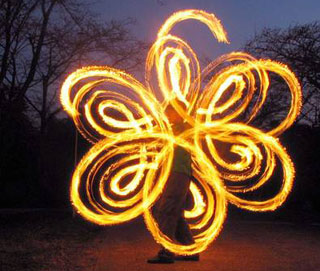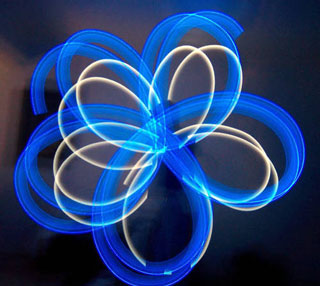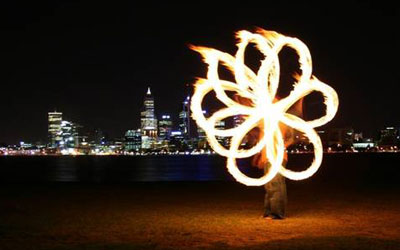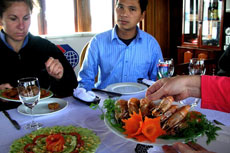Human Flower Project
Monday, August 21, 2006
Blazing Flowers: Poi
An ancient form of Maori dancing has evolved into a fiery Human Flower Project.

Anti Spin Six Petals Flower
Photo: Home of Poi
Strike a match. Turn out the lights. And watch the practitioners of poi sketch flowers in the air.
As the grass turns dead gold and temperatures top 100 each day, we’re in the right mind for blooms of fire. Here they are. Poi, we’ve learned, is an old form of Maori dance, a kind of juggling using cords weighted at the ends with balls, and in this case, balls of fire.
 Kael Anti Spin Flower
Kael Anti Spin Flower
Photo: Home of Poi
Traditionally, “wahine”—female dancers—“performed with balls attached to flax strings, swung rhythmically.” The movements kept hands and wrists flexible for weaving (and could probably do a number on carpel tunnel, too, come to think of it). Maori men also practiced poi to develop the “strength and coordination required during battle. Poi are also used as a training aid for other ancient weapons like the Mere or Patu (Short club).”
Today, poi has escaped New Zealand and become a popular form of dancercize and entertainment in many parts of the world. We read of one 15-week course of study (long enough to quit singeing your hair, perhaps) and beach parties in Thailand, where thousands of spectators come to watch the poi dancers spin their hoops and blossoms under the night sky. Sounds like fun!
At the Home of Poi you’ll find lots more, including terrific photographs of cherry blossoms and a giant, eerie green boutonniere, spun in a cemetery. There’s also “Hugo Doing a Flower” and a tiny movie in case you’d like to get the moves down, Arthur Murray style.
Hope all you poi dancers have gotten crew cuts (just to be on the safe side). You’ve made us see “ephemeral flowers” in a searing new light.

Flower at South Perth
Photo: Home of Poi
Art & Media • Culture & Society • Secular Customs • Travel • Permalink




